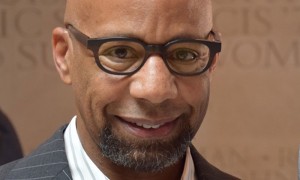Like me, most of the 42 male journalism majors in my graduating class at the Philip Merrill College of Journalism seem to want a career in sports media. Add quite a few of the 85 talented female seniors also graduating with journalism degrees this month from University of Maryland, and we all face plenty of competition.
Over the years, the University of Maryland’s journalism school has produced sports journalism standouts who’ve climbed to acclaim, including ESPN’s Scott Van Pelt and Sports Illustrated’s Robert Klemko.
But, realistically, how many new grads can land jobs as sports journalists? And how can they get a leg up on others?

Kevin Blackistone is a visiting professor of sports journalism at the University of Maryland’s Philip Merrill College of Journalism.
While visiting the University of Maryland my junior year of high school, I attended a panel discussion featuring top sports personalities, including Kevin Blackistone, who discussed the changing landscape of sports media. As a 17-year-old, I left campus with my heart set on returning to College Park as a college freshman.
Four years after visiting Maryland, I joined 14 other Merrill College journalism majors last spring in the sports media class taught by Blackistone, a longtime newspaper columnist turned professor. In search of answers to the questions of my post-graduation future, I turned to, and continue to look to, the man I frequently watch as a panelist for ESPN’s “Around the Horn.”
With the Dallas Morning News for about 16 years, Blackistone, 55, covered Olympics, all the major pro championships, and even the Tour de France. Later, in moving his career to a more digital realm, he wrote for AOL Fanhouse from 2007-2011.
In teaching “Special Topics in News Writing and Reporting; Sports Reporting and Writing” last spring, Blackistone drilled us in beat reporting, pumping out game recaps and creating attention-grabbing features. He even arranged for us to test our skills by doing real-time reporting at Washington Nationals and Wizards games.
His strategies on how to cover sports deepened my understanding, and his feedback sharpened my skills. Those three months gave me confidence – but also ate at it – knowing I face fierce competition among other recent grads.
Even if I’m a standout among my classmates, the competition for sports jobs will be fierce. According to the Pew Research Center, in 2013, the nation produced about 1,800 journalism graduates (bachelor’s and master’s). If maybe 10 percent want a job in sports, how do I get an edge?
I asked advice of the sports journalism instructor I admire. He’s a guy who started out covering hard news and ended up in sports, preferring to write about the substantive issues of sports related to society – like race, economics and health – much more so than World Series winners and Super Bowl champs.
In some ways, Blackistone’s advice pertains to all aspiring journalists, not just us sports types.
This AJR interview is lightly edited and organized for clarity.
American Journalism Review: Did you always want to be a sports reporter?
Kevin Blackistone: Nope, never. When I was in college, I covered sports for the radio station for a little bit, and then I was a stringer for some community newspaper in Chicago. On the weekends, that generally meant covering high school sports. So I had written it before, but I didn’t graduate looking for a sportswriting job. I didn’t look for [sports] in any internship. I graduated wanting to cover news. I’m a Watergate baby. I wanted to bring down the next president more than the next baseball manager.
AJR: Did starting as a news reporter change the way you cover sports?
Blackistone: The fact that that’s what I was drawn to in the beginning changed my approach and how I write about sports. It wasn’t necessarily covering news or economics; it was just that my interest in being a journalist was to look at news in a critical way, change people’s minds, or change policy if it can be changed. Those sorts of things.
AJR: What’s that one piece of advice you’d give an aspiring sports journalist?
Blackistone: Be cognizant of everything that goes on around sports rather than just the sport itself. I think the better reporters and the better writers, when it comes to sports, are those who bring a wealth of knowledge, not just about the sport they are covering or sports in general, but about the world in which sports operates. I think that helps you be a more critical writer about sports. And it kind of tamps down our natural fanaticism about sports.
I would tell anybody, read a lot so you can distinguish good writing from writing that’s not so good. Through osmosis you become a better writer and develop a better nose for news. I think people just need to be curious. Just don’t cover sports and soak it all up and spew it out to your readers or your audience. I think we need to be curious about sports. We need to embrace ignorance so we ask good questions and get good answers.
AJR: What should journalism students do to best prepare for a job and to find success after graduation?
Blackistone: Whether you are interest in being a writer or whether you are interested in being a broadcaster or producer, find a way while you are in school to do the work. This building gives you skills and the tools and the knowledge. But journalism, as a vocation, is best learned by doing it. That’s why in my class my whole thing is to go out, report, bring it back, and we will see what you did well and what you need to do better.
The Diamondback [student newspaper] is not the only outlet on campus; there are a bunch of other publications to write for. One student here as a freshman started his own website with a bunch of other people. Now they actually have advertising, and they are going to pay people some nominal money to write for the website. So just being entrepreneurial. Work for the radio station, that’s what I did. Go bang on anybody’s door who has a publication or some sort of outlet that produces sports journalism. That’s what you did with [Bleacher Report], and now you’re writing for them. Now you’re in the door. It’s not good enough to just come to class. You got to come to class, learn something and then go find some place to implement what you learned.
AJR: Where are the opportunities for aspiring sports journalists? Local newspapers? Online publications?
Blackistone: Clearly the internet space is where the opportunities are. I think that’s where the growth is. But it’s even traditional media and what they’re doing in online space. That’s where it all is. I think there is a lot more in video. Washington Post is gung-ho on PostTV. They do a really good job, and they want to do even more. I know they are going to put a lot more resources into that. The weird thing is there are probably more opportunities now, but you just have to be careful about the opportunities you take. You don’t want them to be opportunities that evaporate because the business model doesn’t work. Who knows how many people start sports websites and they try to poach college students because they want somebody to produce content to fill-up their web space? So you have to be careful you don’t get into a situation where it doesn’t work out. One student in one of my first classes, he got into social media. Now he didn’t learn social media here, but he got into it, and now he works for Fox Sports doing social media for its programs. That’s not an opportunity when he was here that I would’ve said, “Go find it.” But he kept his eyes open and picked up skills along the way and now that’s what he is doing.
AJR: What sport would you suggest a young journalist to specialize or focus on?
Blackistone: You can’t beat football. The coverage of soccer clearly is going to grow because ESPN and Fox Sports have invested in it. I’ve heard lacrosse is going to grow because it is an easily produced television game. It’s a compact field, and there is a physicality to it – a speed to it – that people like. I mean football, period. It’s so big it’s not going anywhere until the whole concussion thing finally catches up with it. I think its better to have a little knowledge of all sports. I don’t think there is one sport that you can bank on as a way of bettering your chances in the business.
AJR: Would you still recommend getting into journalism?
Blackistone: The reason to get into journalism, period, is because you are passionate about it. No one would ever tell you to get into journalism because you envision yourself being rich one day. You can be rich. There is more money being made in journalism now than ever before. There are more people who are journalists who become wealthy because of it than ever before. There is more money in the information business and journalism than ever before. It’s just being distributed differently. The reason you get in is because you are passionate. You want to do journalism.





